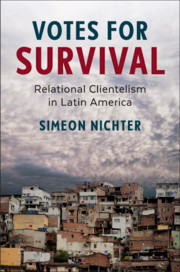Book contents
- Frontmatter
- Dedication
- Contents
- List of Figures
- List of Tables
- Acknowledgments
- 1 Introduction
- Part I Electoral Clientelism
- Part II Relational Clientelism
- 3 Citizens and Relational Clientelism
- 4 Income and Vulnerability
- 5 Declared Support
- 6 Requesting Benefits
- Part III Extensions
- Appendix A Description of Qualitative Fieldwork
- Appendix B Description of Surveys
- Appendix C Signaling Model of Declared Support
- Appendix D Regression Tables for Declared Support
- Appendix E Regression Tables for Requesting Benefits
- Appendix F Regression Tables for Comparative Chapter
- Bibliography
- Author Index
- Subject Index
- Cambridge Studies in Comparative Politics
4 - Income and Vulnerability
from Part II - Relational Clientelism
Published online by Cambridge University Press: 06 December 2018
- Frontmatter
- Dedication
- Contents
- List of Figures
- List of Tables
- Acknowledgments
- 1 Introduction
- Part I Electoral Clientelism
- Part II Relational Clientelism
- 3 Citizens and Relational Clientelism
- 4 Income and Vulnerability
- 5 Declared Support
- 6 Requesting Benefits
- Part III Extensions
- Appendix A Description of Qualitative Fieldwork
- Appendix B Description of Surveys
- Appendix C Signaling Model of Declared Support
- Appendix D Regression Tables for Declared Support
- Appendix E Regression Tables for Requesting Benefits
- Appendix F Regression Tables for Comparative Chapter
- Bibliography
- Author Index
- Subject Index
- Cambridge Studies in Comparative Politics
Summary
Chapter 4 argues that despite rising income, vulnerability often spurs citizens to help sustain relational clientelism.First, it examines Brazil’s substantial pro-poor income growth, fueled in large part by labor income, social pensions, and a conditional cash transfer program. Analyses show that campaign handouts become less attractive as income increases, as theory predicts.Nevertheless, many Brazilians continue to be vulnerable to adverse shocks, providing a motivation to fortify clientelist relationships as a risk-coping mechanism.State efforts to expand Brazil’s social safety net provide inadequate risk protection.Less than a tenth of Brazilians who lose their jobs receive unemployment benefits. Inadequacies in the public healthcare system often contribute to catastrophic out-of-pocket expenditures. And recurring droughts threaten many citizens’ livelihood.During such shocks, Chapter 4 demonstrates why local politicians are often able to assist clients in exchange for political support – there are considerable resources and discretion at the municipal level.Overall, vulnerability provides many citizens a powerful motivation to help sustain relational clientelism.
Keywords
- Type
- Chapter
- Information
- Votes for SurvivalRelational Clientelism in Latin America, pp. 84 - 112Publisher: Cambridge University PressPrint publication year: 2018



